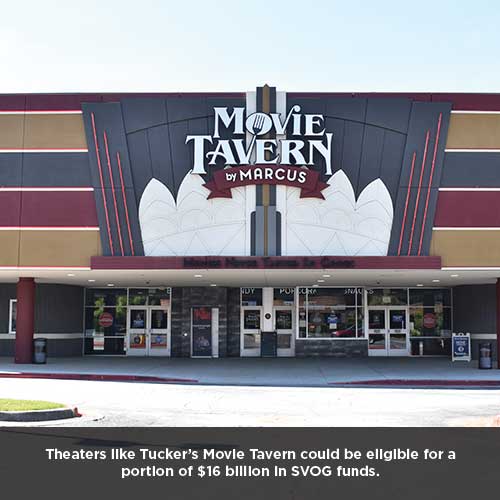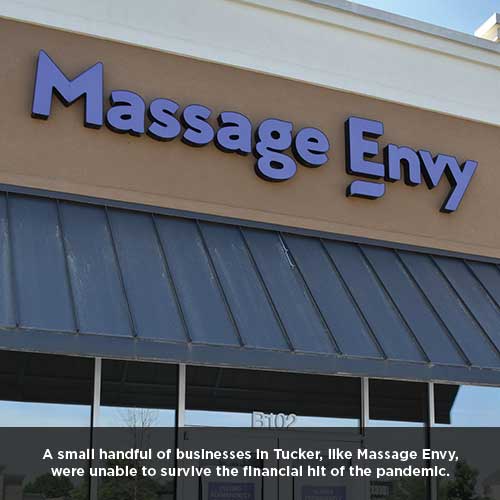 Tucker is undoubtedly one of the fastest-rising business destinations in the Metro Atlanta area. Each month, the Business Boom will seek to show different examples of how Tucker’s business scene is flourishing. This month's column is written by Business Outreach Coordinator, Angela Brooks.
Tucker is undoubtedly one of the fastest-rising business destinations in the Metro Atlanta area. Each month, the Business Boom will seek to show different examples of how Tucker’s business scene is flourishing. This month's column is written by Business Outreach Coordinator, Angela Brooks.
March 2021 marked a one-year anniversary that, arguably, no one wanted to celebrate – a global economy in the grip of a pandemic.
Despite that grim reality, many businesses – particularly small business – did receive some good news in March in the form of the American Rescue Plan (ARP). The $1.9 trillion economic relief package was signed into law and is designed to infuse billions of more dollars into businesses adversely impacted by COVID-19. It also continues some, and expands other, programs that were established under the prior stimulus, the Coronavirus Aid, Relief, and Economic Security (CARES) Act. Additionally, it modifies some eligibility requirements, financial and other components, and resources to help struggling businesses and individuals.

“Our business has been hit hard by COVID, and we could use all the help we can get,” said Rebecca Liska, who owns Pinehill Awards of Tucker along with her husband Danny. “The past year was very difficult. Our fixed expenses remained the same, but our sales plummeted. Thankfully, the CARES grant helped us close out 2020 on a positive note.”
The ARP Act came about to provide additional relief for the nation’s small businesses and hardest-hit industries through existing relief programs and added new efforts to help owners like the Liskas pay those maintenance and payroll expenses, as well as unexpected COVID-related costs.
One such relief program in the existing Small Business Administration (SBA) CARES Act relief program is the Economic Injury Disaster Loan (EIDL), which receives another $15 billion and is set aside for the Targeted EIDL program. It’s designed for certain small organizations and for entities that had previously applied for the program under the CARES Act, but did not receive all or a portion of their $10,000 grant. Go to www.sba.gov for details.
The ARP is also purported to make some provisions easier to understand and to access – such as eligibility requirements and eligibility across programs, which in some instances allow businesses to apply for and potentially receive funds from multiple programs. It also provides more grant funds and forgivable loans.
FUNDING FOR SHUTTERED VENUE OPERATORS
The existing Shuttered Venue Operators Grant (SVOG) is amended by the ARP Act. The program includes over $16 billion in grants, to be administered by SBA’s Office of Disaster Assistance. Entities eligible to apply include live venue operators or promoters, theatrical producers, live performing arts organization operators, museum operators, motion picture theater operators, and talent representatives. The SBA has more information, including a dedicated portal SVOG with requirements, eligibility, FAQs and more on their website.
PAYBACK PROTECTION PROGRAM
The Paycheck Protection Program (PPP) is an SBA-backed loan designed to help businesses keep their workforce employed during the pandemic. Program changes have been made under ARP in an effort to make access to PPP loans more equitable – equity became a hot-button issue when PPP was initially launched under the CARES Act. Also, if you have previously received a Paycheck Protection Program (PPP) loan, certain businesses are eligible for a Second Draw PPP loan, and some borrowers may be eligible for loan forgiveness.
RESTAURANT REVITALIZATION FUND
Like other parts of the country, Tucker’s restaurants and bars were among the hardest hit businesses over the past year. Fear and shelter-in-place orders drastically reduced customer traffic, and later social distancing requirements severely limited most restaurants’ use of available seating for indoor dining.
“We lost about 60 percent of our revenue when COVID first hit,” said chef and general manager Austin Phillips of Shorty’s Pizza. And at the same time, they faced increased costs for meat and dairy – another side effect of the pandemic. “As you can imagine, we use a lot of cheese,” he added.
There’s help in the form of grants, not loans. The Restaurant Revitalization Fund provides $28.6 billion in direct relief to restaurants through its new grant program. Five billion dollars of this allocation is set aside specifically for small establishments with gross annual receipts of less than $500,000. Grants can be used for payroll costs, rent and utility payments, mortgage interest, supplies, and paid sick leave. A variety of food and drink establishments are eligible, including restaurants, bars, food trucks, caterers, tasting rooms, brewpubs, and so on.
EMPLOYER TAX CREDITS
A multitude of employer tax credits have material changes and extensions resulting from the ARP implementation. The tax credits are provided to reimburse 100 percent of leave wages paid by an employer who provides employees with qualifying paid leave taken for specified reasons related to COVID-19. Consult your tax advisor or the SBA for all the specifics and qualifications related to each available tax credit and your business.
Plummeting revenues and dwindling customer bases, mostly driven by last year’s shelter-in-place orders, forced some business owners to cut their payrolls by releasing or furloughing some staff members.
“Our business was down 50 percent in April of 2020,” said Starlene Kirkland, co-owner of Swept Away Cleaning and Janitorial. “People were – and some still are – afraid to have us come and clean. So many more people started working from home. Their kids were home from school, and they just didn’t feel comfortable having people other than immediate family inside their homes.”
 UNEMPLOYMENT INSURANCE
UNEMPLOYMENT INSURANCE
Unemployment insurance has helped many non-traditional, home-based and entrepreneurial businesses stay afloat. ARP makes important changes to the major unemployment insurance programs created by the CARES Act, ensuring that they are extended and continued. Two of these programs related to business owners include Pandemic Unemployment Assistance (PUA) and the Mixed Earner Unemployment Compensation (MEUC). The PUA program, which is for workers who are not traditionally eligible for unemployment insurance (such as independent contractors), has been extended through early September 2021. The MEUC program targets freelancers and gig economy workers and provides financial assistance to those individuals who receive at least $5,000 in self-employment income. More details can be found on the Georgia Department of Labor’s website, www.dol.georgia.gov.
SBA DEBT RELIEF
The SBA also offers debt relief to existing SBA loan borrowers whose businesses have been impacted by COVID-19. Businesses in Tucker and throughout the country continue to struggle and many have been forced to alter their operations or just plain shut their doors completely because of this crisis. Althea Jenkins’ business was a local casualty of the pandemic.
“This is a very real issue with small businesses actually closing because of the pandemic,” said Jenkins. Her high-touch business, Massage Envy Spa, opened in the Tucker Meridian Shopping Center in 2018. “I am so sad. My business closed permanently in March because of COVID.” Despite available funding, her customer base just did not rebound enough for her to remain open.
Despite unprecedented losses brought on by this pandemic, the City of Tucker remains committed to helping current businesses to grow, develop and expand, while continuing to work to attract new opportunities to enhance our local economy. Visit our website regularly at www.tuckerga.gov to stay abreast of what’s happening and what resources that may be beneficial to your business.
Note: This column provides a high-level overview of some of the Plan’s major provisions, but make sure to go to the appropriate sources to get comprehensive information that may be available to help your small business.

